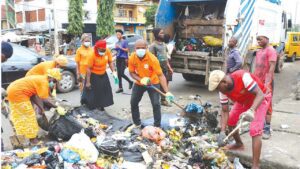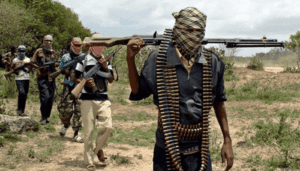
Incessant reign of kidnappers call for concern
The spate of insecurity have continued to be under siege as kidnappers have raised their focus on several offices in some part of the country.
Nigerians have long awoke to great and cheering news, either in the media or from their neighbours, because of increasing security challenges witnessing deaths and destruction across the country.
There is hardly any part of the country that is not facing one form of security challenge or another as kidnapping, cultism, banditry, insurgency, sea piracy, among others are commonplace with people losing their lives and security operatives overstretched.
Yesterday, no fewer than two persons were kidnapped in the Mpape area of the Federal Capital Territory.
It was learnt that gunmen stormed the area and whisked away two residents.
A resident of the area, who identified himself as Yakubu said the gunmen were about six.
He said, “At about 1 am today, gunmen numbering six came to our area shot sporadically while the operation lasted, and kidnapped two people. “
An unspecified number of members of the National Youth Service Corps (NYSC) have reportedly been kidnapped by unidentified armed men.
In a similar situation of insecurity, the Ogun State Community, Social Orientation and Safety Corps, otherwise known as So-Safe Corps rescued a businesswoman kidnapped last week.
A 32-year-old suspect, Tunde Salami, was arrested in connection with the incident.
It was gathered that the victim was kidnapped while she was going home from a market in Ijebu-Ode.
Aside the police and security forces intervention, there have been several ‘silent unreported cases’ that heighten fear of kidnapping across the length and breadth of the country.
And, kidnappers go beyond students, they perpetrate the religious sector. A case of an attack in Baptist church in Northwest Nigeria, kidnapping 25 worshippers from a Sunday service, a senior church leader said on Monday.
Insecurity is one of the top challenges president Bola Tinubu need to take into swift effect.
Recalled that Attackers burst into the Bege Baptist Church in Chikun area of Kaduna State, initially abducting 40 people, though 15 later managed to get away, Reverend Joseph Hayab, head of the Christian Association of Nigeria in Kaduna State.
Heavily armed gangs known locally as bandits frequently carry out mass abductions for ransom in northwest and central Nigeria, holding their captives in camps hidden in vast forest that stretch across the region.
Abductions for ransom and intercommunal attacks have been on the rise again after a lull during elections in February and March for the presidency and governorship posts.
Earlier last month, ten school children were also kidnapped in central Kaduna, though eight later managed to escape two weeks after their abduction.
Last year, gunmen opened fire on a Catholic church in southwest Ondo state, killing at least 40 people in a rare attack an area usually considered safer.
As well as battling criminal gangs, Nigeria’s armed forces are also fighting a 14-year-long jihadist conflict in the northeast of the country and simmering separatist tensions in the southeast.
Meanwhile, The Ogun State Police command has advised religious leaders in the state to seek police protection before religious activities are held.
The warning is coming in the wake of the attack on a Redeemed Christian Church of God (RCCG) in Abule-Ori, Obafemi-Owode Local Government of the State, where a pastor was killed and seven worshippers kidnapped by some unknown gunmen.
The Police also tasked churches and mosques to take into consideration that early evenings would be more secure for worshippers to hold their services and return home safely on time before sunset.
Alamutu advised religious organizations to cooperate with the ongoing contingency plans of the police in Ogun, saying strategies to halt the trend had been put in place.
Earlier this year, the bandits also stormed a Mosque and distrusted the ongoing Jumma prayers by shooting at the worshippers.
Some of the worshippers it was gathered also got wounded from the bullet wounds.
The bandits were said to have raided the town and some Communities in the area during which they were shooting at anybody they came across just as the villagers had to run for their lives during which two of them were gunned down.
According to report, Boko-Haram/ISWAP-related atrocities constituted 22.11 percent (at least 272 deaths). Political killings mostly due to the recent 2023 General Elections claimed at least 7.72 percent constituting at least 95 deaths.
Meanwhile, Kidnapping can be curbed in Nigeria when there is good standard of living, provision of employment for the youths, stiffer penalties for culprits, good leadership at all level of government, promulgation of relevant laws and their enforcement, proper data of immigrants and foreign nomads in the country, and sound moral and religious teachings. These will help reduce the unfortunate act of kidnapping in Nigeria.
To combat kidnapping, government must first, ensure effective border control. Second, there should be provision of a reliable and unique identification number of each individual such as National ID card, driver’s license, and voter cards for tracking social benefits and other identification purposes.
Third, curbing corruption with and among Nigerian law enforcement agencies. If the corruption within and among the few Nigerian law enforcement agencies is tackled, the problem of kidnapping for ransom is half dealt with. This will in turn restore the confidence in Nigerians by feeding law enforcement agencies the necessary information to tackle kidnapping for ransom.
Fourth, creating a better relationship between the locals and Nigerian law enforcement agencies.
However, in relation to Nigeria’s present situation, the Nigerian government should establish dedicated community policing, therefore creating a better relationship with traditional leaders, religious leaders, youths, and other social organisations within communities in Nigeria. This will aid in curbing the problem of kidnapping in Nigeria as trust is been established between the community and with law enforcement being consistent and available when kidnapping incidents arise.



